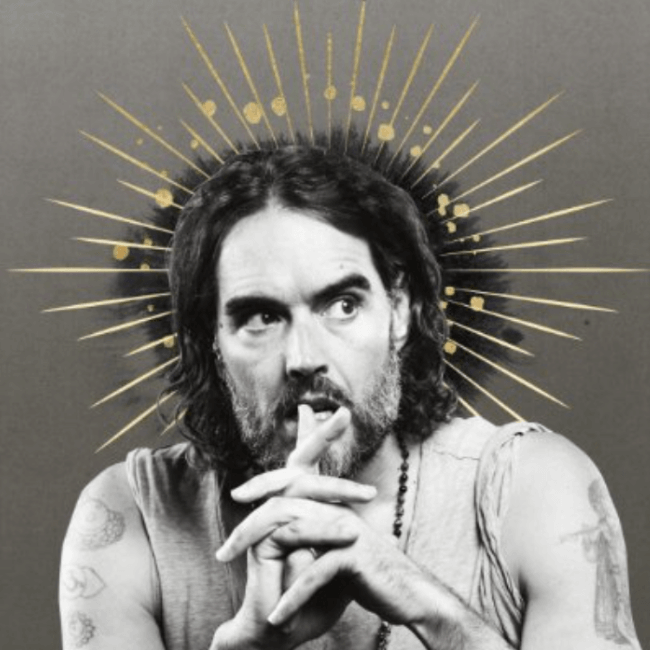Narratives that echo the themes of Russian propaganda are spread not only by Western politicians and journalists but also by actors and comedians. Using their skills, they attempt to capture the audience’s attention to later convince them of the truthfulness of their statements. Therefore, VoxCheck, in collaboration with the Center for Countering Disinformation of the National Security and Defense Council of Ukraine, continues to explain how certain Western opinion leaders distort reality, aligning it with Russian narratives, and how to counteract this.
Russell Brand is a British actor, publicist, television, and radio presenter. He began his career as a comedian.
Russel Brand. Source: Russell Brand’s Twitter page
His career is scandalous: in 2001, he was fired from MTV for dressing as Osama bin Laden the day after the September 11 terrorist attacks.
In 2008, Brand was involved in a series of scandals: he made a prank call to the police, claiming to have seen the person responsible for a series of attacks, made offensive remarks about U.S. President George Bush, on the air of Radio 2, together with a guest, he sent another speaker, who did not come to the studio, an offensive voice message (for this Russell was fired from the show). The British media regulator fined the BBC £150,000 for the incident.
In 2023, the actor was accused of sexual violence and harassment, including involving minors.
Russell Brand has a large audience: 6.7 million subscribers on his YouTube channel, 1.73 million on Rumble, and over 11 million on X (formerly Twitter). He uses all this reach to promote conspiracy theories, anti-vaccine ideas, and narratives that resonate with Russian propaganda.
For example, on October 19, 2023, in one of his videos on his YouTube channel, Brand talks about alleged Nazi units in Ukraine, citing the example of the “Azov” battalion, and accuses the United Kingdom of supporting Nazism.
“We were alongside with the Soviet Union against actual Nazis. This war, we seem to be fighting alongside actual Nazis against Russia without no one telling us that. That’s what happening. Not suggesting all Ukrainians are Nazis, just that they are literally Nazi battalions within the Ukrainian forces. That’s commonly understood. Commonly understood but inconvenient, just true”.
The former radio host continues to spread themes of Nazism in Ukraine, following the Russian propaganda narrative. Interestingly, The New York Times found that after February 24, 2022, the use of the term “Nazism” in Russian sources regarding Ukraine increased significantly, but experts note that “present-day Ukraine is by no means a Nazi state.”
Now, let’s return to Brand’s thesis. Ukrainian units are not created based on ideology. In Ukraine, volunteers from different countries with different nationalities, religions, and views are fighting. They can serve in the International Legion. Moreover, the Armed Forces of Ukraine have units composed of Russian citizens: the Russian Volunteer Corps and the Legion “Freedom of Russia.”
Interestingly, while providing examples of “Nazi battalions,” he mentions only one case — “Azov.” Unfortunately, Russian propaganda has successfully discredited this unit of the National Guard of the Ministry of Internal Affairs since 2014. In reality, “Azov” has never been a neo-Nazi unit. It includes people who speak both Ukrainian and Russian and adhere to various religions such as Orthodox Christianity, Catholicism, Protestantism, Judaism, and more. In Mariupol, a sizable Jewish community had no problems with “Azov” over the eight years. Similar situations exist with other ethnic and religious groups, including Muslims and Greeks.
To spread disinformation, Russell Brand manipulates facts. For example, in this case, he juxtaposes a reputable media outlet (The Time) with media of questionable quality (WSWS). He presents facts that suit his narrative and compares reliable and unreliable media in terms of reliability, creating the illusion that everyone is reporting and thinking as he claims.
Russell Brand also spreads fakes from Russian state media. In one of his shows, he quoted Canadian anti-war activist Jake Kallio and American journalist Benjamin Norton, claiming that in 2014, with the participation of the United States, there was a “state coup” in Ukraine:
“Ukraine has been destabilized by violence since 2014 when a US-sponsored coup d’etat overthrew its democratically elected government, setting off a civil war. That conflict dragged on until February 24, 2022, when Russia invaded the country, escalating into a new, even deadlier phase of the war.”
The 2014 Euromaidan, also known as the Revolution of Dignity, shows no signs of a state coup. State coup does not involve a conspiracy by a small group of people, is not a mass phenomenon, and has a violent nature. In reality, it was a reaction of the population to then-Ukrainian President Viktor Yanukovych’s refusal to sign an association agreement with the EU.
According to a sociological study conducted in October 2014 by the Ilko Kucheriv Democratic Initiatives Foundation, approximately 20% of Ukraine’s population (over 8.5 million people) participated in peaceful protests. The majority of people perceived the protests as a struggle for their rights. According to the survey, most Ukrainians saw the protests as a fight for their rights. The events of the Revolution of Dignity unfolded in a constitutional manner. Protesters began to use self-defense measures in response to the escalation of violent actions by the authorities, which involved armed units of law enforcement to disperse unarmed demonstrators.
Also, the United States, like other Western states and their representatives, was not involved in the events of Euromaidan. Ukraine is a sovereign state with its own authorities responsible for internal and external policies.
By labeling the Revolution of Dignity as a “state coup,” Russian propaganda distorts the concepts. In this way, it allows pseudo-experts to talk about a “civil war” supposedly triggered by dissatisfaction among Ukrainians with changes in the country. This diverts attention from Russia’s annexation of Crimea, the Donetsk and Luhansk regions, and the onset of the Russo-Ukrainian War as a result and justifies Russia’s full-scale invasion of Ukrainian territory.
Furthermore, Russell Brand promotes another narrative aligned with the Russian one: he attempts to portray Ukraine as a state that does not share the democratic values of the West:
“In January, Zelenskyi passed a bill … meaning that it will be able to regulate all media in Ukraine. All. So, you are not allowed to have media in Ukraine unless it is regulated, so is this the freedom that we are fighting for? Of course, what they say, it’s temporary, and the pressure, no one is saying that Russia’s invasion of Ukraine is not criminal, but that’s authoritarianism, isn’t it? You can’t have American taxpayers dollars being poured into Ukraine to fight against a criminal entity without there being supervisors and conditions placed upon; thar otherwise, there is no purpose to what you are fighting for.”
President Volodymyr Zelenskyш signed Law No. 2693-d “On Media” on December 29, 2022. While it sparked criticism from the public, its approval was a step toward Ukraine’s accession to the EU. Ukraine was required to implement certain provisions of European legislation at the national level, including developing a unified legal framework for the media.
Experts from the Council of Europe published an assessment of the compliance of Ukraine’s Law “On Media” with the EU Directive 2018/1808 on audiovisual media services (“AVMSD”) and Council of Europe standards. They stated that the law largely complies with the provisions of the directive.
On the contrary, Ukraine is implementing democratic reforms necessary for EU accession, even in the face of a full-scale invasion. Accusing us of authoritarianism and lack of democracy is inappropriate.
Therefore, British actor, commentator, TV and radio host Russell Brand in the West promotes narratives that resonate with Russian propaganda. To achieve this, he uses social platforms (YouTube, X (Twitter), Rumble), where Brand has a large audience. Part of his popularity has been gained through scandals.
For the credibility of his words, he uses materials from Western media. However, he does this manipulatively. Brand selects facts advantageous to him and takes them out of context. In doing so, the host equates conscientious and unscrupulous media. The latter often spread anti-Ukrainian narratives. This makes the arguments appear more confident, and the sources more reliable. Therefore, it is essential to fact-check the media relied upon by such hosts. The “Media Bias/Fact Check” resource can assist in this, as it evaluates sources for bias. If the media is deemed reliable by this resource, it is worth thoroughly reviewing the material to get the full information and understand the news context.
Also, watch about Russell Brand in this video.
Attention
The authors do not work for, consult to, own shares in or receive funding from any company or organization that would benefit from this article, and have no relevant affiliations


